As a local, I’m excited to take you on a journey through the city’s most iconic sites – places that make New Orleans so unique.
From historic sites to vibrant cultural hubs, we’ll explore the heart and soul of this incredible city – its timeless traditions and vibrant spirit.
With its rich heritage and diverse influences, New Orleans is a city like no other – a true gem in the heart of America.
Key Takeaways
- Explore the city’s most significant cultural landmarks.
- Discover the history and significance behind each site.
- Experience the unique blend of traditions and culture.
- Visit iconic places that make New Orleans so special.
- Uncover the city’s vibrant soul and timeless traditions.
The French Quarter: Heart of New Orleans Culture
The French Quarter is more than just a neighborhood; it’s the pulsating heart of New Orleans, where history meets modern-day revelry. As you wander through its narrow streets, you’ll discover a unique blend of architectural styles, cultural landmarks, and entertainment venues that make this district so captivating.
Historic Architecture and Voodoo Shops
The French Quarter is renowned for its historic architecture, with buildings that date back to the 18th century. The iconic Creole townhouses, with their ornate ironwork and balconies, are a testament to the city’s rich cultural heritage. As you explore the Quarter, you’ll also come across voodoo shops like the New Orleans Historic Voodoo Museum, where you can learn about the history and practice of this ancient spiritual tradition.
“New Orleans is the city that made me realize that jazz is not just a style of music, but a way of life.” – Wynton Marsalis
Iconic Bourbon Street
No visit to the French Quarter is complete without experiencing the legendary Bourbon Street. This iconic thoroughfare is known for its vibrant nightlife, with numerous bars, clubs, and live music venues that keep the party going until the early hours of the morning. Whether you’re looking for a quiet drink or a lively dance floor, Bourbon Street has something for everyone.
| Landmark | Description |
|---|---|
| Bourbon Street | Famous for its nightlife and entertainment |
| Jackson Square | Historic park surrounded by street artists and performers |
| Voodoo Shops | Stores offering voodoo artifacts and spiritual services |
Jackson Square and Its Artists
At the heart of the French Quarter lies Jackson Square, a historic park that has been the hub of artistic and cultural activity for centuries. The square is surrounded by talented street artists, musicians, and performers, creating a lively atmosphere that’s perfect for people-watching. You can also visit the nearby St. Louis Cathedral, a beautiful example of Gothic Revival architecture that adds to the square’s charm.
As you explore the French Quarter, you’ll discover that it’s a place where history, culture, and entertainment come together in a unique and captivating way. Whether you’re interested in historic sites, iconic landmarks, or simply soaking up the local atmosphere, the French Quarter has something to offer everyone.
The Garden District: A Stroll Through History
The Garden District’s unique blend of history, architecture, and Southern charm makes it a fascinating place to explore. As a local, I’ve had the pleasure of strolling through this iconic neighborhood many times, and each visit reveals something new and captivating.
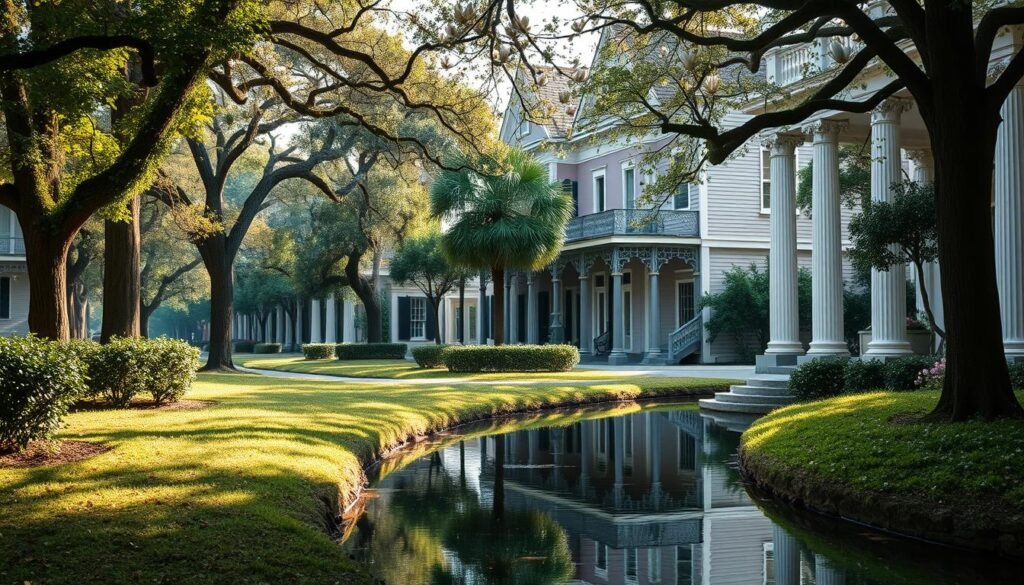
Grand Mansions and Historic Homes
The Garden District is renowned for its stunning antebellum mansions, showcasing a mix of architectural styles that reflect the city’s rich history. From Greek Revival to Italianate, these grand homes are a testament to the craftsmanship of the era. As you walk along the tree-lined streets, you’ll notice the intricate details and ornate decorations that make each house a work of art.
Some of the most famous mansions in the Garden District include the Robinson House and the Breaux House, both exemplifying the architectural grandeur of the period. Visiting these homes offers a glimpse into the lives of the families who once inhabited them, providing a personal connection to the history of New Orleans.
Lafayette Cemetery No. 1
No visit to the Garden District is complete without a stop at Lafayette Cemetery No. 1, one of the city’s most historic cemeteries. Established in 1833, this cemetery is a unique cultural landmark, featuring elaborate above-ground tombs and mausoleums. The cemetery’s layout and architecture reflect the city’s history and cultural practices, making it a fascinating place to explore.
As you wander through the narrow paths, you’ll notice the varying styles of the tombs, from simple to ornate, each telling a story of the person or family buried there. Lafayette Cemetery No. 1 is not just a place of remembrance but also a significant historical site that offers insights into New Orleans’ past.
Southern Live Oaks and Landscapes
The beauty of the Garden District is not just in its architecture but also in its natural landscapes. The neighborhood is famous for its Southern live oaks, majestic trees that line the streets and provide a canopy of shade. These trees, some of which are centuries old, add to the District’s charm and character.
| Landmark | Description | Historical Significance |
|---|---|---|
| Robinson House | Greek Revival mansion | Built in 1850 |
| Lafayette Cemetery No. 1 | Historic cemetery | Established in 1833 |
| Southern Live Oaks | Majestic trees | Centuries old |
Visiting the Garden District is like taking a step back in time, surrounded by the history, architecture, and natural beauty that make New Orleans so unique. Whether you’re a history buff, an architecture enthusiast, or simply someone who appreciates the beauty of old trees and grand homes, the Garden District has something to offer.
St. Louis Cathedral: A Religious and Cultural Gem
As a local, I’ve always been drawn to St. Louis Cathedral, a place where history, faith, and culture blend seamlessly. Located in Jackson Square, this cathedral is not just a religious site but a cultural landmark that embodies the spirit of New Orleans.
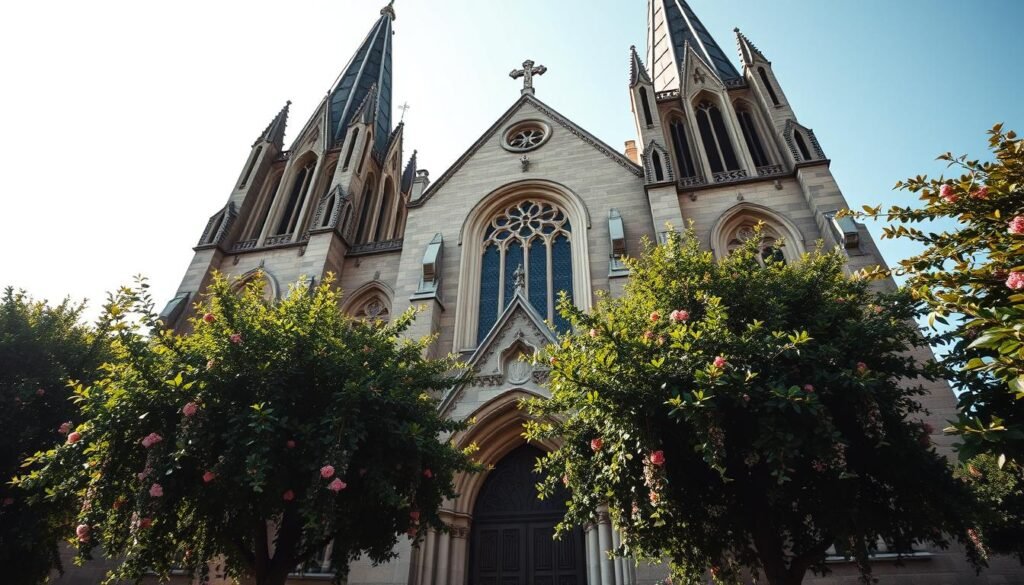
Architectural Marvels
The cathedral’s architecture is a blend of Gothic, Romanesque, and Caribbean styles, reflecting the diverse influences on New Orleans’ culture. Its striking facade, with three tall spires, is a iconic sight in the French Quarter.
Key architectural features include:
- Stunning stained-glass windows that filter in colorful light
- Intricate stone carvings and ornate details
- A blend of historical and modern architectural elements
Historical Significance
St. Louis Cathedral has stood the test of time, with its history dating back to the 18th century. It has witnessed significant events in New Orleans’ history, from colonial times through the Civil War and beyond.
The cathedral is a testament to the city’s resilience and its ability to preserve its heritage amidst change.
Community Events and Services
Beyond its historical and architectural significance, St. Louis Cathedral remains an active place of worship and community gathering. It hosts various religious services, concerts, and cultural events throughout the year.
Some notable events include:
- Masses and religious ceremonies
- Musical performances and concerts
- Cultural festivals and community gatherings
Visiting St. Louis Cathedral offers a unique glimpse into New Orleans’ soul, making it a must-see destination for anyone interested in the city’s cultural heritage.
The National WWII Museum: A Journey Through Time
If you’re looking for a truly immersive experience in New Orleans, look no further than The National WWII Museum. As a local, I’m proud to call this museum one of our city’s hidden gems, and I’m excited to share its significance with you.
Exhibits and Interactive Experiences
The National WWII Museum is renowned for its comprehensive and engaging exhibits that take you on a journey through the American experience in World War II. With a vast collection of historic artifacts, personal stories, and interactive displays, the museum provides a unique learning experience. Visitors can explore the D-Day invasion of Normandy through immersive multimedia displays, or step into the replica of a WWII landing craft to understand the bravery and sacrifice of those who served.
One of the standout features is the Road to Tokyo and Road to Berlin exhibits, which detail the campaigns in the Pacific and European theaters. The museum also includes a collection of oral histories from veterans, providing a personal and poignant perspective on the war.
Importance of the Museum
The National WWII Museum is not just a collection of artifacts; it’s a preservation of history and a tribute to the bravery and sacrifice of the men and women who served during WWII. It serves as an important educational resource, offering a detailed look at the events that shaped the world.
The museum’s impact extends beyond its walls, contributing to a broader understanding of the war’s significance and its relevance to contemporary issues. It’s a must-visit for anyone interested in history, making it one of the top new orleans tourist attractions.
Visitor Information
Planning your visit to The National WWII Museum is easy. Located in the heart of New Orleans, the museum is accessible by various modes of transportation. Here are some key details to help you plan your trip:
| Category | Details |
|---|---|
| Address | 945 Magazine St, New Orleans, LA 70112 |
| Opening Hours | 9:00 AM – 5:00 PM |
| Ticket Prices | Adults: $28, Seniors (65+): $24, Students (with ID): $18 |
Whether you’re a history buff or just looking for a meaningful experience, The National WWII Museum is undoubtedly one of the must-see spots in new orleans and a highlight among the best places to visit in new orleans.
Mardi Gras World: The Festivity Factory
Step into Mardi Gras World, and you’ll discover the secrets behind New Orleans’ most iconic celebration. As a local, I’ve had the pleasure of experiencing the magic of Mardi Gras, and Mardi Gras World is where it all comes together.
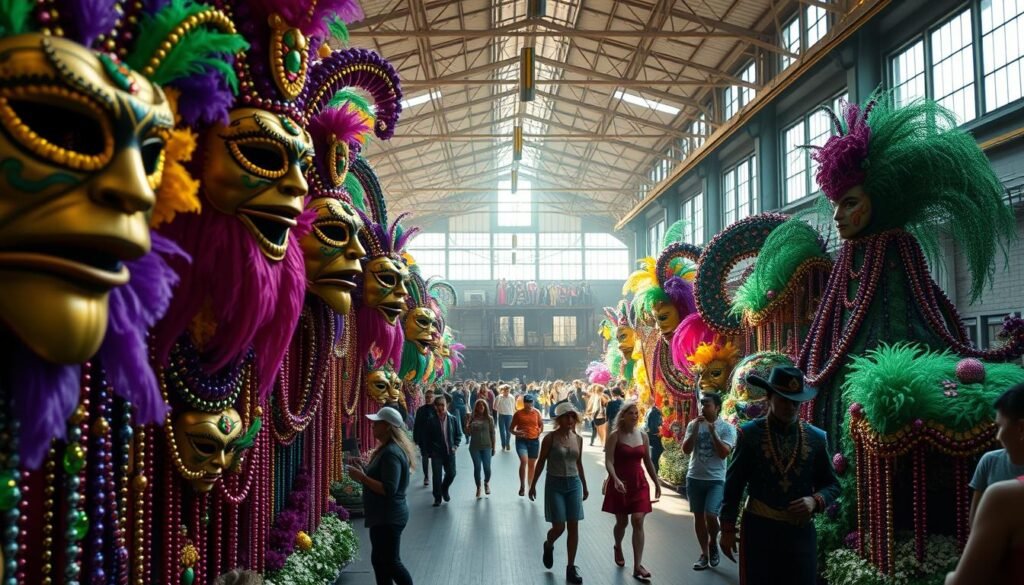
Behind-the-Scenes Tour
Mardi Gras World offers a unique behind-the-scenes tour that gives visitors a glimpse into the making of the floats, costumes, and other Mardi Gras essentials. You’ll see artists at work, crafting intricate designs and bringing the Mardi Gras spirit to life.
The tour is an immersive experience, allowing you to walk among the giant floats and understand the artistry and craftsmanship that goes into creating them. It’s a fantastic way to appreciate the effort and dedication that makes Mardi Gras so spectacular.
History of Mardi Gras
Mardi Gras has a rich history in New Orleans, dating back to the 18th century. Mardi Gras World celebrates this heritage by showcasing historical exhibits and artifacts. You can explore the evolution of Mardi Gras, from its early days to the present, and see how it has become an integral part of the city’s identity.
“Mardi Gras is a time when New Orleans lets its hair down and celebrates life, music, and culture. Mardi Gras World is the perfect place to experience this vibrant energy.” – Local Resident
Art and Design in Float Making
The art of float making is a highlight of Mardi Gras World. The floats are not just structures; they are works of art that require meticulous planning and execution. Visitors can witness the design process and see the floats up close, gaining a deeper appreciation for the creativity involved.
- Intricate designs and colorful decorations
- Large-scale sculptures and figurines
- Traditional Mardi Gras themes and modern twists
Mardi Gras World is a testament to New Orleans’ cultural heritage and its ability to blend tradition with innovation. Whether you’re a local or a visitor, Mardi Gras World is an iconic place in New Orleans that should not be missed.
Preservation Hall: A Shrine to Jazz Music
As a local, I’ve always been drawn to Preservation Hall, where the air is alive with the sounds of jazz legends. This iconic venue is dedicated to preserving the traditional jazz heritage of New Orleans, offering an intimate and authentic experience for visitors from around the world.
Intimate Concert Experiences
Preservation Hall is renowned for its intimate concert experiences. With a seating capacity of just under 100, the Hall provides a cozy and immersive environment where the audience is mere feet away from the performers. The intimacy of the setting fosters a deep connection between the musicians and the audience, making every performance a memorable one.
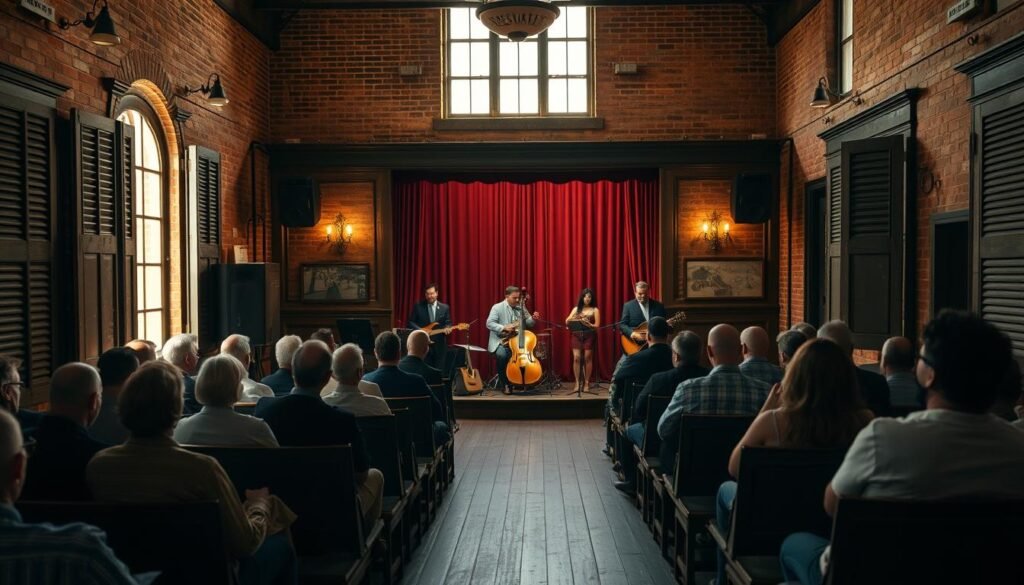
Legendary Performers
Over the years, Preservation Hall has hosted some of the most legendary performers in jazz, including the likes of George Lewis, Jim Robinson, and the Preservation Hall Jazz Band. These musicians have not only contributed to the Hall’s legacy but have also played a significant role in keeping the traditions of New Orleans jazz alive. For more insights into Preservation Hall’s educational initiatives and its role in preserving jazz legacy, you can read here.
Connection to New Orleans Heritage
Preservation Hall is deeply connected to the cultural heritage of New Orleans. The venue is a testament to the city’s rich musical history and its influence on the development of jazz. By preserving and promoting this heritage, Preservation Hall continues to be a cultural heritage site in New Orleans, attracting visitors who are eager to experience the city’s unique musical traditions.
Visiting Preservation Hall is like stepping into a different era, one where the sounds of traditional New Orleans jazz fill the air, and the spirit of the city comes alive. It’s a must-see spot for anyone interested in the cultural and musical heritage of New Orleans.
The New Orleans Museum of Art: A Creative Hub
Discovering the New Orleans Museum of Art is like uncovering a treasure chest of artistic expression and community spirit. As a local, I’ve had the pleasure of watching this institution grow and evolve, becoming a cornerstone of our city’s cultural landscape.
Diverse Art Collections
The museum boasts an impressive collection of art from around the world, including European and American paintings, sculpture, and photography. One of the highlights is the collection of art from the 19th and 20th centuries, featuring works by artists such as Monet and Picasso.
The museum’s collections are not static; they are constantly being refreshed with rotating exhibitions that bring new and exciting works to the forefront. This ensures that there’s always something new to discover, making the museum a compelling destination for both locals and visitors.
Beautiful Sculpture Garden
Adjacent to the museum is the Besthoff Sculpture Garden, a 11-acre oasis in the heart of City Park. The garden features over 60 sculptures amidst beautiful landscapes and walking paths, creating a serene and contemplative atmosphere.
Visitors can stroll through the garden, enjoying the interplay of art and nature. It’s a unique experience that combines the beauty of the outdoors with the creativity of the sculptures on display.
Community Events and Programs
The New Orleans Museum of Art is more than just a repository of art; it’s a vibrant community hub. The museum hosts a variety of community events and programs, including art classes, lectures, and family-friendly activities.
These events not only enrich the cultural life of the community but also make art accessible to a wide audience. Whether you’re an art aficionado or just looking for a unique experience, the museum has something to offer.
In conclusion, the New Orleans Museum of Art is one of the iconic places in New Orleans, offering a rich cultural experience that is not to be missed. It’s a testament to the city’s commitment to preserving and celebrating its artistic heritage.
The Ogden Museum of Southern Art: A Celebration of the South
As a local, I’m excited to share with you one of our city’s best-kept secrets: the Ogden Museum of Southern Art, a celebration of Southern art and culture. This museum is a treasure trove of the region’s history, offering a unique perspective on the American South’s cultural heritage.
Focus on Southern Artists
The Ogden Museum stands out for its dedication to Southern artists, showcasing a wide range of works that highlight the region’s diverse cultural landscape. From the 19th century to the present, the museum’s collection includes paintings, sculptures, and other mediums that tell the story of the South’s complex history and its people’s resilience.
Some of the notable artists featured include:
- George Rodrigue
- Walter Anderson
- William H. Johnson
Unique Exhibitions
The museum is known for its innovative exhibitions that not only showcase the art of the South but also explore its cultural and historical contexts. These exhibitions are designed to be engaging and thought-provoking, offering visitors a deeper understanding of the region’s heritage.
For example, the museum has hosted exhibitions on the Civil Rights Movement, the impact of Hurricane Katrina, and the cultural significance of jazz in New Orleans. These exhibitions demonstrate the museum’s commitment to exploring the complexities of Southern culture.
Educational Programs and Tours
The Ogden Museum offers a variety of educational programs and tours designed to enhance visitors’ understanding of Southern art and culture. From guided tours to hands-on art activities, these programs cater to a wide range of ages and interests.
Some of the programs include:
- Guided tours for adults and children
- Art workshops and classes
- Lectures and symposia on Southern art and history
Whether you’re a local or just visiting New Orleans, the Ogden Museum of Southern Art is a must-visit destination that offers a unique glimpse into the region’s rich cultural heritage.
City Park: Nature Meets Culture
As we explore the must-see spots in New Orleans, City Park stands out as a 1,300-acre oasis in the heart of the city, offering a unique blend of natural beauty and cultural attractions. This iconic destination is a must-visit for anyone looking to experience the city’s great outdoors.
Scenic Landscapes and Activities
The Park’s scenic views and walking and biking trails make it perfect for a leisurely stroll or an adrenaline-packed adventure. Visitors can enjoy the Besthoff Sculpture Garden, featuring over 60 sculptures amidst beautiful gardens and walking paths.
Cultural Experiences
City Park is home to the New Orleans Museum of Art and the Ogden Museum of Southern Art, making it a hub for art lovers. The Park also hosts various cultural events and festivals throughout the year, including the New Orleans Jazz & Heritage Festival.
Festivals and Community
Throughout the year, City Park hosts numerous festivals and events that showcase the city’s vibrant culture. From music festivals to cultural celebrations, there’s always something happening in this iconic New Orleans destination, making it one of the top new orleans tourist attractions.
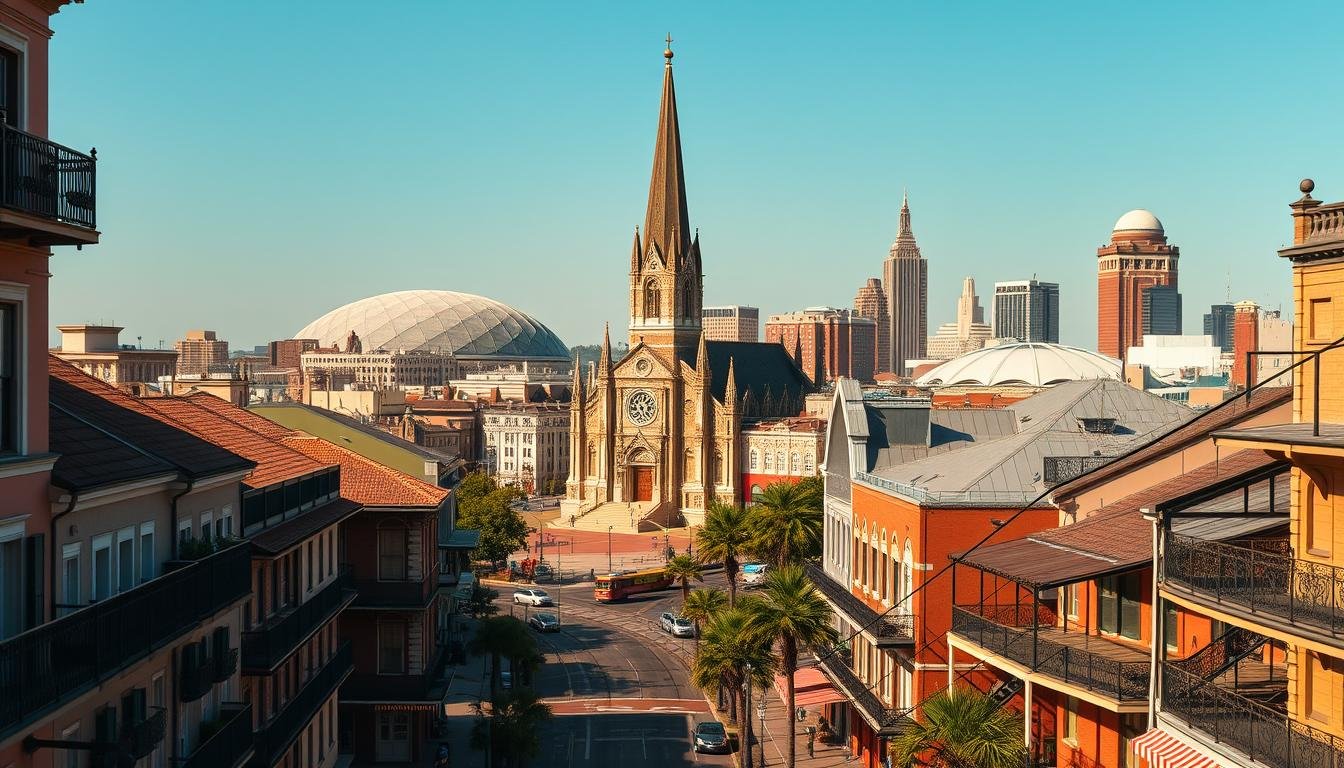
Leave a Reply